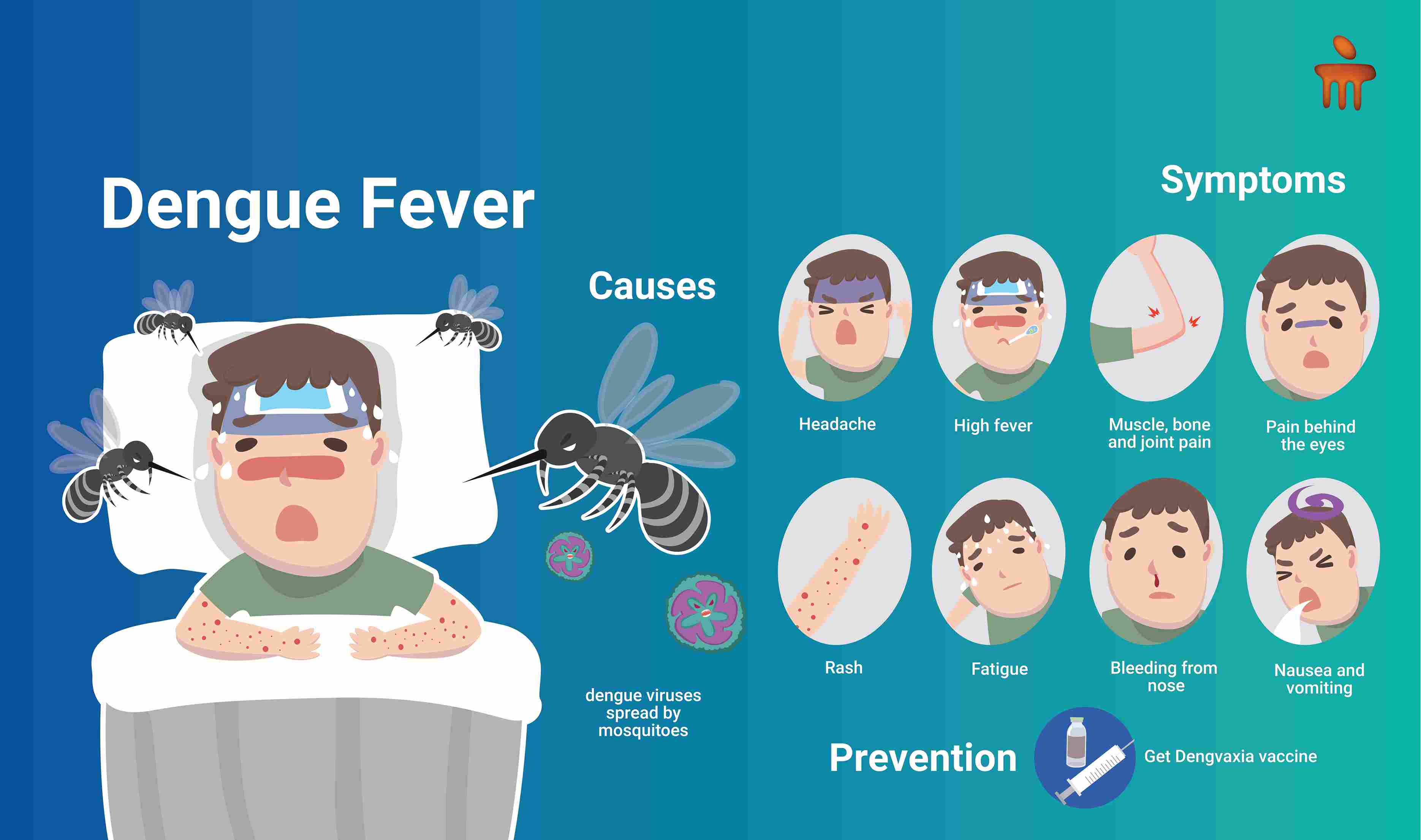
Dengue fever is a viral infection that can cause severe sickness, mild flu-like symptoms, or no symptoms at all. One in every four people infected will become unwell. The incidence of new dengue cases has increased in recent decades. According to the World Health Organisation (WHO), shifting land use patterns, increased international travel and trade, and the climate crisis have all contributed to dengue's spread.
What is Dengue Fever?
Dengue fever is a virus-based infection that is most common in the world's tropical climates. Through blood-sucking bites, the female Aedes mosquito spreads dengue-causing virus cells from infected persons to healthy people. The virus then spreads from the vector to the host, where it rapidly replicates the dengue-causing virus.

Symptoms of Dengue
After entering the host, the virus cells grow and it takes 2-12 days for any dengue symptoms to show. The symptoms and severity of the illness vary depending on the kind of serotype. These dengue fever symptoms include:
-
Sudden fever
-
High temperature
-
Pain in eyes
-
Nausea and vomiting
-
Bleeding from nose and gums.
-
Toothache
-
Skin rashes
-
Severe joint pain
-
Headache
-
Swelling in lymph nodes
Many people recover in about a week. In certain conditions, the symptoms worsen and might become life-threatening. The blood arteries become damaged and leaky, lowering the number of platelets (clot-forming cells) in the bloodstream. Dengue haemorrhagic fever or dengue shock syndrome might result from this. Some common dengue fever symptoms in severe cases include:
-
Severe abdominal pain
-
Vomiting
-
Bleeding in gums and nose.
-
Blood in urine, stools and vomiting.
-
Difficulty in breathing
-
Cold Skin
-
Fatigue
-
Restlessness
Visit a top multispecialty hospital immediately if you are experiencing dengue fever symptoms.
Dengue Fever Causes
A significant cause of dengue is a viremic transmission of the dengue-causing virus from a dengue-infected person to a healthy host by mosquito bites. This occurs when a mosquito bites an infected person and the virus is then transferred into the host when the same mosquito bites another person.
Dengue is frequently found in human-inhabited regions, and the disease's vectors thrive in stagnant water, such as open drains, tanks, unattended flower vases, and water-filled discarded tyres. It may sometimes spread sexually and intravenously as well. The difficulties with these forms that have been documented, though, are minor.
Dengue Fever Stages
Dengue is contagious in about 40% of the total population across the globe. Early diagnosis greatly increases the likelihood of an early recovery. Dengue has different stages based on how severe and how it affects the host:
-
Stage I
1-5 days include the acute fever stage. At this stage, the patient is experiencing stomach discomfort, nausea, and vomiting along with a high fever. When kids do not eat or drink enough and become weak, parents should immediately consult the doctor.
-
Stage II
It is the important stage depicted from Day 5 to Day 7. When the body temperature dips within 24 hours, the plasma (the fluid component of blood) escapes and the blood pressure drops. The patient may feel weak, and restless, have cold, clammy skin, a quick pulse, and in severe cases with very low platelets, they may vomit blood, and have an internal haemorrhage.
-
Stage III
It is the stage that includes the recovery phase. It mainly takes a few days for patients to return to normal. At this stage, the patient's appetite returns, their pulse rate slows down, and they develop a convalescent rash over their legs and arms.
Consult an internal medicine specialist if you need dengue fever treatment. You can also visit our evening clinic in case you need a consultation for dengue fever.



















 3 Min Read
3 Min Read













